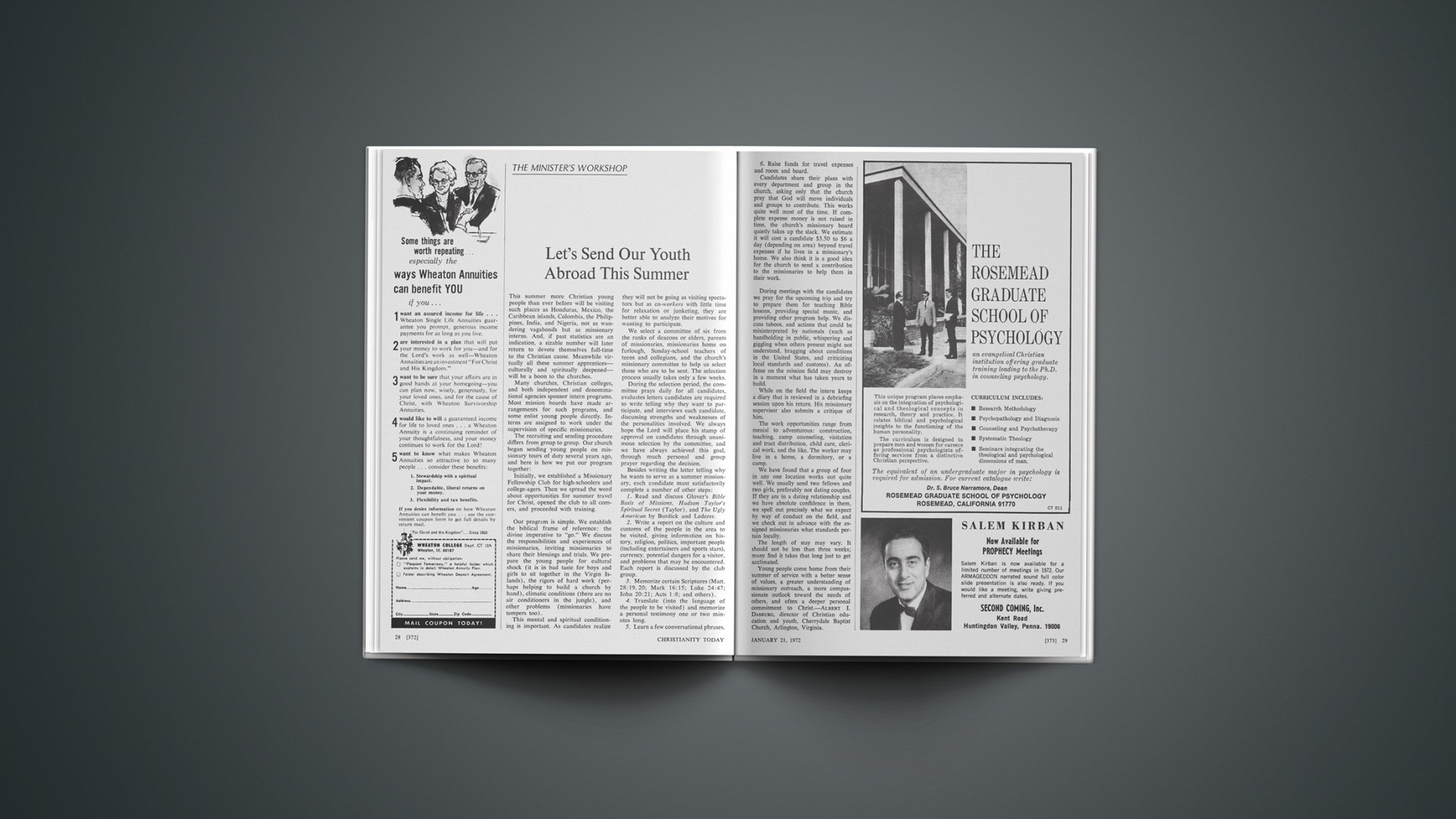This summer more Christian young people than ever before will be visiting such places as Honduras, Mexico, the Caribbean islands, Colombia, the Philippines, India, and Nigeria, not as wandering vagabonds but as missionary interns. And, if past statistics are an indication, a sizable number will later return to devote themselves full-time to the Christian cause. Meanwhile virtually all these summer apprentices—culturally and spiritually deepened—will be a boon to the churches.
Many churches, Christian colleges, and both independent and denominational agencies sponsor intern programs. Most mission boards have made arrangements for such programs, and some enlist young people directly. Interns are assigned to work under the supervision of specific missionaries.
The recruiting and sending procedure differs from group to group. Our church began sending young people on missionary tours of duty several years ago, and here is how we put our program together:
Initially, we established a Missionary Fellowship Club for high-schoolers and college-agers. Then we spread the word about opportunities for summer travel for Christ, opened the club to all comers, and proceeded with training.
Our program is simple. We establish the biblical frame of reference: the divine imperative to “go.” We discuss the responsibilities and experiences of missionaries, inviting missionaries to share their blessings and trials. We prepare the young people for cultural shock (it is in bad taste for boys and girls to sit together in the Virgin Islands), the rigors of hard work (perhaps helping to build a church by hand), climatic conditions (there are no air conditioners in the jungle), and other problems (missionaries have tempers too).
This mental and spiritual conditioning is important. As candidates realize they will not be going as visiting spectators but as co-workers with little time for relaxation or junketing, they are better able to analyze their motives for wanting to participate.
We select a committee of six from the ranks of deacons or elders, parents of missionaries, missionaries home on furlough, Sunday-school teachers of teens and collegians, and the church’s missionary committee to help us select those who are to be sent. The selection process usually takes only a few weeks.
During the selection period, the committee prays daily for all candidates, evaluates letters candidates are required to write telling why they want to participate, and interviews each candidate, discussing strengths and weaknesses of the personalities involved. We always hope the Lord will place his stamp of approval on candidates through unanimous selection by the committee, and we have always achieved this goal, through much personal and group prayer regarding the decision.
Besides writing the letter telling why he wants to serve as a summer missionary, each candidate must satisfactorily complete a number of other steps:
1. Read and discuss Glover’s Bible Basis of Missions, Hudson Taylor’s Spiritual Secret (Taylor), and The Ugly American by Burdick and Lederer.
2. Write a report on the culture and customs of the people in the area to be visited, giving information on history, religion, politics, important people (including entertainers and sports stars), currency, potential dangers for a visitor, and problems that may be encountered. Each report is discussed by the club group.
3. Memorize certain Scriptures (Matt. 28:19, 20; Mark 16:15; Luke 24:47; John 20:21; Acts 1:8; and others).
4. Translate (into the language of the people to be visited) and memorize a personal testimony one or two minutes long.
5. Learn a few conversational phrases.
6. Raise funds for travel expenses and room and board.
Candidates share their plans with every department and group in the church, asking only that the church pray that God will move individuals and groups to contribute. This works quite well most of the time. If complete expense money is not raised in time, the church’s missionary board quietly takes up the slack. We estimate it will cost a candidate $3.50 to $6 a day (depending on area) beyond travel expenses if he lives in a missionary’s home. We also think it is a good idea for the church to send a contribution to the missionaries to help them in their work.
During meetings with the candidates we pray for the upcoming trip and try to prepare them for teaching Bible lessons, providing special music, and providing other program help. We discuss taboos, and actions that could be misinterpreted by nationals (such as handholding in public, whispering and giggling when others present might not understand, bragging about conditions in the United States, and criticizing local standards and customs). An offense on the mission field may destroy in a moment what has taken years to build.
While on the field the intern keeps a diary that is reviewed in a debriefing session upon his return. His missionary supervisor also submits a critique of him.
The work opportunities range from menial to adventurous: construction, teaching, camp counseling, visitation and tract distribution, child care, clerical work, and the like. The worker may live in a home, a dormitory, or a camp.
We have found that a group of four in any one location works out quite well. We usually send two fellows and two girls, preferably not dating couples. If they are in a dating relationship and we have absolute confidence in them, we spell out precisely what we expect by way of conduct on the field, and we check out in advance with the assigned missionaries what standards pertain locally.
The length of stay may vary. It should not be less than three weeks; many find it takes that long just to get acclimated.
Young people come home from their summer of service with a better sense of values, a greater understanding of missionary outreach, a more compassionate outlook toward the needs of others, and often a deeper personal commitment to Christ.—ALBERT I. DASBURG, director of Christian education and youth, Cherrydale Baptist Church, Arlington, Virginia.










